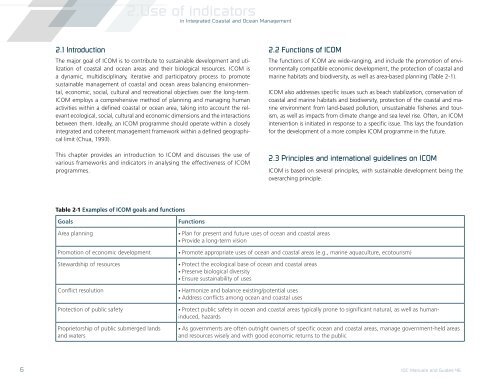5 - unesdoc - Unesco
5 - unesdoc - Unesco
5 - unesdoc - Unesco
You also want an ePaper? Increase the reach of your titles
YUMPU automatically turns print PDFs into web optimized ePapers that Google loves.
2.1 Introduction<br />
The major goal of ICOM is to contribute to sustainable development and utilization<br />
of coastal and ocean areas and their biological resources. ICOM is<br />
a dynamic, multidisciplinary, iterative and participatory process to promote<br />
sustainable management of coastal and ocean areas balancing environmental,<br />
economic, social, cultural and recreational objectives over the long-term.<br />
ICOM employs a comprehensive method of planning and managing human<br />
activities within a defined coastal or ocean area, taking into account the relevant<br />
ecological, social, cultural and economic dimensions and the interactions<br />
between them. Ideally, an ICOM programme should operate within a closely<br />
integrated and coherent management framework within a defined geographical<br />
limit (Chua, 1993).<br />
This chapter provides an introduction to ICOM and discusses the use of<br />
various frameworks and indicators in analysing the effectiveness of ICOM<br />
programmes.<br />
Table 2-1 Examples of ICOM goals and functions<br />
Goals Functions<br />
2.2 Functions of ICOM<br />
Area planning • Plan for present and future uses of ocean and coastal areas<br />
• Provide a long-term vision<br />
The functions of ICOM are wide-ranging, and include the promotion of environmentally<br />
compatible economic development, the protection of coastal and<br />
marine habitats and biodiversity, as well as area-based planning (Table 2-1).<br />
ICOM also addresses specific issues such as beach stabilization, conservation of<br />
coastal and marine habitats and biodiversity, protection of the coastal and marine<br />
environment from land-based pollution, unsustainable fisheries and tourism,<br />
as well as impacts from climate change and sea level rise. Often, an ICOM<br />
intervention is initiated in response to a specific issue. This lays the foundation<br />
for the development of a more complex ICOM programme in the future.<br />
2.3 Principles and international guidelines on ICOM<br />
ICOM is based on several principles, with sustainable development being the<br />
overarching principle.<br />
Promotion of economic development • Promote appropriate uses of ocean and coastal areas (e.g., marine aquaculture, ecotourism)<br />
Stewardship of resources • Protect the ecological base of ocean and coastal areas<br />
• Preserve biological diversity<br />
• Ensure sustainability of uses<br />
Conflict resolution • Harmonize and balance existing/potential uses<br />
• Address conflicts among ocean and coastal uses<br />
Protection of public safety • Protect public safety in ocean and coastal areas typically prone to significant natural, as well as human-<br />
induced, hazards<br />
Proprietorship of public submerged lands<br />
and waters<br />
2.Use of indicators<br />
in Integrated Coastal and Ocean Management<br />
• As governments are often outright owners of specific ocean and coastal areas, manage government-held areas<br />
and resources wisely and with good economic returns to the public<br />
6 IOC Manuals and Guides 46

















